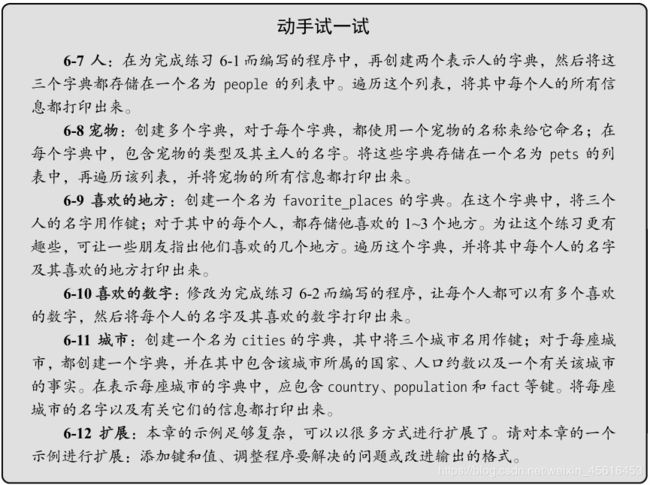《Python编程:从入门到实践》字典嵌套实践
Sunjichen = {
"first_name" : "Sun",
"last_name" : "jichen",
"city" : "Dezhou",
"age" : "19",
}
Lihanpeng = {
"first_name" : "Hanpeng",
"last_name" : "Li",
"city" : "Yantai",
"age" : "20",
}
Xiaominghao = {
"first_name" : "Minghao",
"last_name" : "Xiao",
"city" : "Taian",
"age" : "19",
}
people = [Sunjichen, Lihanpeng, Xiaominghao]
print(people)
6-8
kitty = {
'type' : 'dog',
'master' : 'Tom',
}
bob = {
'type' :'cat',
'master' : 'Jim',
}
rocket = {
'type' : 'turtle',
'master' : 'Sam',
}
pets = [kitty,bob,rocket]
print(pets)
6-9
favourite_places = {
'Sunjichen' : ["Xian","Shanghai","beijing"],
'Lihanpeng' : ["Tianjin","Yantai"],
'Xiaominghao' : ["Taipei"],
}
for name, places in favourite_places.items():
if len(places) > 1:
print("\n" + name + "`s favourite places are:")
for place in places:
print("\t" + place)
else:
print("\n" + name + "`s favourite place is:")
print("\t" + place)
6-10
favourite_numbers = {
'sunjichen' : ['9','10','11'],
'lihanpeng' : ['8','17','222'],
'xiaominghao' : '7',
'zhangenbo' : '6',
'zhoutao' : '5',
}
for name,numbers in favourite_numbers.items():
if len(numbers) > 1 :
print("\n" + name + " `s favourite numbers are:")
for number in numbers:
print("\t" + number)
else :
print("\n" + name + " `s favourite numbers is:")
print("\t" + numbers)
6-11
cities = {
'beijing' : {
'country' : 'china',
'population' : '21540000',
'fact' : 'capital of China',
},
'tokyo' : {
'country' : 'japan',
'population' : '13290000',
'fact' : 'capital of Japan',
},
'new york' : {
'country' : 'america',
'population' : '8510000',
'fact' : 'a big city',
},
}
for city,info in cities.items():
print("\n" + city.title())
print(city.title() + " is in " + info['country'].title())
print(city.title() + " has a population of " + info['population'])
print(city.title() + " is " + info['fact'])
